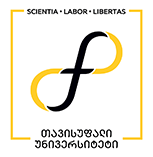Bachelor’s in International Relations
03 აპრილი 2018
School: | International Relations |
Program Title: | International Relations - Far East, Middle East, West |
Qualification awarded: | Bachelor's in International Relations |
Program Credits: | 240 ECTS |
Language of Instruction: | Georgian |
Duration of the Programme: | 4 years |
Objectives of the Programme:
Bachelor Program aims to prepare International Relation specialists for governmental and non-governmental sector with a broad and thorough knowledge of international law, economic relations, diplomatic relations and modern political processes. Graduates of the programme simultaneously possess not only a high proficiency in the language of their chosen region (in addition to English), but also countries’ historical, cultural and religious background. The study requires a thorough understanding of global, political, economic, social and ideological tracks of global problems and world history.
Bachelor's Program in International Relations has three course directions, among which the student makes their choice during their first year:
- Far East,
- Middle East
- West (US and Europe)
Career Options:
After completing the Bachelor Programme the graduate will be able to work in various fields, including, but not limited to:
- Foreign policy, Defence, Security;
- International, NGO and other business organizations;
- Consultancy and Analysis in International Relations;
- Education.
Learning Outcomes:
After completion of Bachelor Program, graduates will own general and specific competencies listed below:
General Competences:
- effective oral and written communication;
- public speaking;
- critical thinking;
- analytical skills;
- research methodology;
- communications in foreign languages;
- ability to continuously learn and deepen the knowledge;
- ability to adapt and act in unfamiliar and changing environments;
- ability to use modern information and communication technologies;
- ability to appreciate and respect differences and cultural diversity.
Specific Competences:
- theoretical knowledge of international relations;
- political view on history;
- understanding how international institutions (organizations) work, types of relationships and processes between them, as well as the values and outlook of the Far and Near Eastern region, European countries and US;
- understanding of the dynamics of the international political economy and its structural peculiarities;
- understanding of the humanitarian problems that exist in the world community;
- proficiency in the languages, history, culture, literature and religion of the countries of the Far East, the Middle East and the West (US and Europe);
- knowledge of diplomacy; concepts, peculiarities and principles of terrorism; security basics, history of wars, ways and means of settlement of old and modern conflicts;
- ability to independently create UN resolution projects;
- ability to hold diplomatic correspondence and negotiations;
- analysis of current political processes;
- ability to deepen their decision-making processes, distinguish what factors that can influence decisions in Eastern /Western organizations and/or countries;
- knowledge of the basic principles that work in making decisions for countries’ foreign and domestic policies;
- professional responsibility and understanding of ethics (including dichotomic ethics), basic principles of sustainable development.




